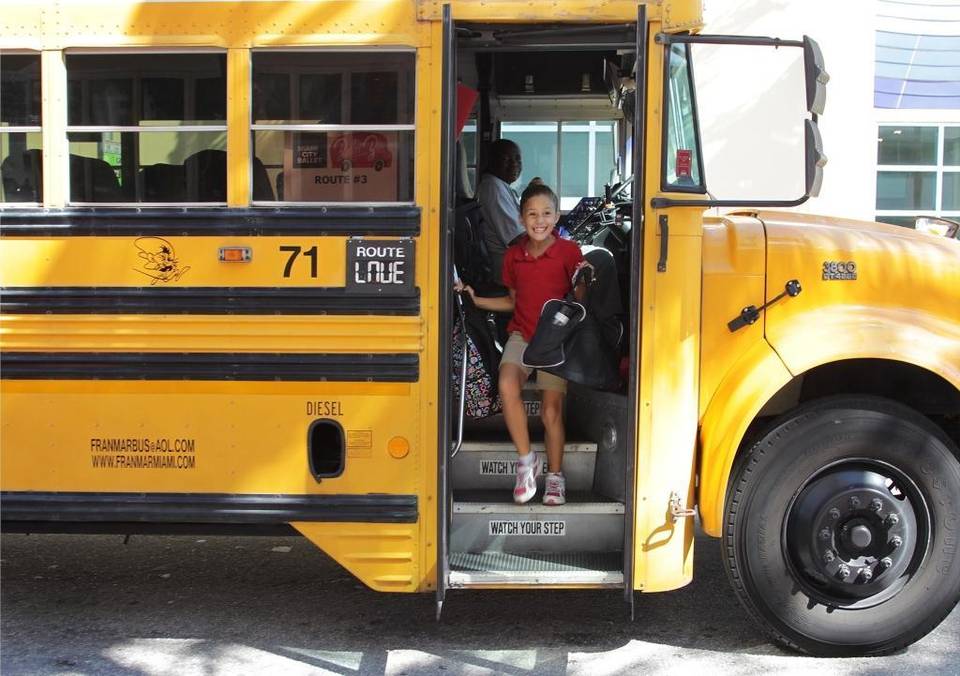Many education advocates, including Miami-Dade County Public Schools, want the Legislature to vote “no” Monday on a $419 million, 278-page education bill — which lawmakers cannot change — that was released Friday evening as part of the 2017-18 budget package. CARL JUSTE Miami Herald
TALLAHASSEE
A swift outcry of condemnation came over the weekend from many parents, teachers and school administrators who want the Florida Legislature to reject a $419 million, 278-page K-12 public schools bill — which was decided behind closed doors, which lawmakers cannot change and which they’ll have had only about 72 hours to review when they vote Monday.
House and Senate members will decide the fate of HB 7069 as part of several up-or-down votes on a 2017-18 budget package. The Legislature extended its annual session until 11:59 p.m. Monday with the intent of passing an $82.4 billion spending plan, its single constitutional obligation.
Public education advocates, like the Florida PTA and other groups, and superintendents — including Miami-Dade County Public Schools chief Alberto Carvalho — aim to convince their elected representatives to vote “no.” Such an outcome is unlikely but not unprecedented, and it would potentially call the entire budget into question because of the major dollars attached.
“I’ve spoken to so many senators — both parties — who are opposed to so many portions of that bill,” Broward County Sen. Gary Farmer, D-Lighthouse Point, said. “The question is: Will they have the fortitude to vote no?”
HB 7069 stands to massively reform K-12 public education in Florida through myriad proposals gleaned from at least 55 House and Senate bills filed this session, as well as language never before discussed or considered publicly or — in one case — that was already defeated by a Senate committee, a Herald/Times analysis found.
House Speaker Richard Corcoran’s office issued a statement to the Herald/Times, along with answers in response to two dozen questions, saying: “Negotiating solutions when there are significant differences between the two chambers on an issue in conference sometimes requires adding new language and bringing in issues that were not part of the budget conference. That is often what it takes to reach agreement and is inherent to the conference process.”
The mammoth bill covers everything from phonics education and students’ sunscreen use, to testing reforms and virtual learning. Its signature provisions are:
▪ a $234 million plan guaranteeing teacher bonuses for the next several years;
▪ a $140 million “Schools of Hope” program to help perpetually failing traditional schools and to entice specialized, privately managed charter schools to compete in those mostly low-income neighborhoods;
▪ and a new formula that forces school districts to share with charter schools millions in local tax revenue earmarked for school projects.
It also would regulate how Title I federal dollars are distributed, which Carvalho said could “undermine support for fragile schools.”
Critics say the bill isn’t all bad, but they are offended by the process by which the rewrite of HB 7069 abruptly surfaced Friday and that so much unrelated education policy will rise or fall by a single vote.
The legislation was negotiated in private with no chance for public input, cobbled together at the insistence of Corcoran as a condition of budget talks, and not released until Friday evening — blind-siding parents, education stakeholders and most lawmakers, even those involved in offering input behind the scenes.
MORE: “In last-day surprise, Legislature loads education policy into pass/fail budget”
But it’s the wide-ranging contents of the legislation itself that has vocal opponents, like Carvalho, most concerned.
“We’re being asked to basically accept an ounce of honey in exchange for a gallon of vinegar,” Carvalho told the Herald/Times on Sunday, as he vowed the Miami-Dade school district — Florida’s largest and the fourth largest school district in the country — would “spare no effort” to voice its objections on HB 7069 and the sparse increase to overall education spending in the budget.
To counter the criticism, House Republicans launched a coordinated social media campaign to promote HB 7069 — with some materials released before it was officially agreed to at a brief public hearing Friday night between Corcoran and Senate President Joe Negron, R-Stuart.
“I think that is going to go down as one of the greatest K-12 bills in the history of the state of Florida,” Corcoran, R-Land O’Lakes, told reporters afterward, dismissing the lack of transparency in how the bill came together and rejecting that it included policies not yet vetted by lawmakers.
One of the only groups to praise the bill is the conservative Florida Coalition of School Board Members, a group of about 50 members statewide that quickly heralded HB 7069 as “a quantum leap forward in student-centered education.” (Negron’s wife, Rebecca, is a Martin County School Board member and on the coalition’s board of directors; the group’s past president Erika Donalds, a Collier County School Board member, is the wife of Rep. Byron Donalds, R-Naples.)
It’s #Christmas for ed reformers in Florida! @fcsbm getting nearly everything on our list in #HB7069! @StrategyShawn @BridgetAZiegler https://t.co/DTfxUS2UDs
— Erika Donalds (@ErikaDonalds) May 5, 2017
The Herald/Times identified several examples within HB 7069 of not only new policy but also language substantively different than what lawmakers previously discussed in public hearings this spring.
For instance, the bill restricts local governments’ ability to regulate “student enrollment and occupant load” of charter schools, in addition to the previously discussed exemptions charter schools would get from local zoning regulations.
A provision to require daily school recess suddenly exempts charter schools, too — something parent advocates and the original bill sponsors were stunned to discover. The fact that recess was in the budget bill at all disappointed many parents.
“They feel like recess was just kind of this very nice, sweet, pure movement — it was something for the kids — and they feel like it was just used in a mean way, a nasty way, as political leverage,” Miami parent Kate Asturias said Sunday.
MORE: “Parents who want recess say lawmakers are using kids as ‘pawns in a political game’ ”
Among the most substantive changes from past discussions, the final compromise on a plan to expand bonuses for teachers and principals calls for an awards structure and time-line that differs from what lawmakers contemplated in public hearings.
As introduced in March, the House’s proposed expansion of its “Best & Brightest” program was to include principals and broaden the criteria for which teachers could qualify for awards of up to $10,000 — addressing two years of complaints that the bonuses unfairly linked a teacher’s high school SAT/ACT scores to their ability to be “highly effective” in the classroom.
Now, HB 7069 keeps intact the beleaguered program for another three years under the same conditions but with the addition of bonuses for top principals. It delays any new qualifying criteria until 2021 and, in the mean time, caps the teacher bonus at $6,000. (About 7,200 teachers this year received $6,800 bonuses, a decrease in award amount from the $8,200 given out per recipient in the program’s first year in 2015.)
Meanwhile, House Republicans tout a new addition to the compensation program: Bonuses for almost all teachers in the 2017, 2018 and 2019 school years. They advertise the bonuses as a guaranteed $1,200 for teachers rated “highly effective” and $800 for teachers rated “effective”; however, the bill includes a caveat that the $800 awards could be pro-rated depending on the amount of money made available by the Legislature.
Corcoran’s office did not respond to a request for a breakdown — or answer whether one had been done — of how many teachers and principals might qualify for the “Best & Brightest” awards next year, as well as the number of “highly effective” and “effective” teachers who might get the general bonus. In the 2015-16 school year, 75,800 classroom teachers earned “highly effective” marks, while 85,900 were declared “effective.”
The Florida Education Association, the state’s largest teachers union, remains opposed to the “Best & Brightest” program even under HB 7069 — favoring actual pay increases for teachers, not bonuses that aren’t assured year after year.
The compromise on “Schools of Hope” marks significantly different policy than what passed the House in March after nine hours of debate or what senators discussed in their mere 90 minutes of committee hearings. The result is the culmination of weeks of private bipartisan talks among key House and Senate members, as well as input from superintendents.
“We’ve made significant modifications,” House Education chairman Michael Bileca, R-Miami, told reporters. “You basically have a variety of models and modes to really make a transformative change for these kids that are in these turnaround schools. …. I think what we’ve done is unprecedented.”
The new guidelines for the program include a chance for traditional schools to receive state aid to improve their standing and pay for wraparound community services, such as after-school programs.
The bill caps the number of traditional schools that can get those dollars at 25. (The Legislature identified 115 perpetually failing schools this year.) Each approved school could receive “up to $2,000” per student, “based upon the strength” of the school’s plan to use the dollars and implement “evidence-based interventions” that help the kids and better the school’s performance.
“I will say the Schools of Hope, from where they began, are so much better now,” said Tampa Rep. Janet Cruz, leader of the House Democratic caucus, which unanimously opposed the program before. “The wraparound benefits for public schools, providing funding first for public schools, for us, is a big win. … We feel good that we tailored and tamped down the original.”
The majority of the “Schools of Hope” funding would still go to a loan and incentive program aimed at attracting specialized charter school operators to compete in Florida. The $140 million intended for “Schools of Hope” is not explicitly earmarked in the bill, unlike the teacher bonus money, the $15 million for testing reforms and the $30 million to expand the Gardiner Scholarship for students with disabilities and rare diseases.
Most worrisome to Miami-Dade schools, though, is the proposed new formula for how capital dollars would be divided among traditional and public schools.
The plan would cost the district $25 million in unanticipated spending in 2017-18, Carvalho said — adding that that obligation would increase and have “long-term repercussions” as the number of charter schools continues to multiply. He said, though, he was also glad to see that the formula factored in districts’ debt payments before requiring dollars to be shared.
Overall, he and other critics said the good of the bill doesn’t outweigh the bad.
“You’re hearing a chorus of significant concern across the state,” Carvalho said. “Parents, teachers, and principals, quite frankly, are scratching their heads about a rushed piece of legislation.”
[“Source-miamiherald”]






